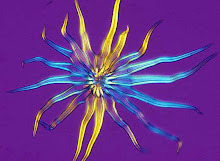skip to main |
skip to sidebar
Beachcombing 1.




 We've just returned from a walk along Warkworth beach in Northumberland with our pockets full of seashells, but sadly they never look quite so good when you bring them home and they dry out, quickly losing the lustre that they had when they were wet. Fortunately I took a few photos of them in situ, as a reminder of their true beauty. Star find was the painted topshell Calliostoma zizyphinum (top two photos), with exquisite colours and a shape that shows how it came by its common name – just like an child’s old-fashioned spinning top. We’ve been walking along this beach for a quarter of a century and in all that time have found less than a dozen of these, so it was nice to see it again. This mollusc feeds in deep water in the sub-tidal zone, so to see the living animal you’d need luck and a very low spring tide - unless you're a diver. The next two photos show two colour forms of the very common but nonetheless delightful banded wedge shell Donax vittatus. This is often one of the commonest bivalve shells on this beach and after storms live specimens, that normally live buried below the sand surface within and below the intertidal zone, are often washed out of the sand. And finally – and this is a tentative identification – a banded venus Clausinella fasciata, about as large as a thumbnail with exquisite purple markings. If anyone can confirm this ID, or knows its certain identity, I’d be grateful for advice.
We've just returned from a walk along Warkworth beach in Northumberland with our pockets full of seashells, but sadly they never look quite so good when you bring them home and they dry out, quickly losing the lustre that they had when they were wet. Fortunately I took a few photos of them in situ, as a reminder of their true beauty. Star find was the painted topshell Calliostoma zizyphinum (top two photos), with exquisite colours and a shape that shows how it came by its common name – just like an child’s old-fashioned spinning top. We’ve been walking along this beach for a quarter of a century and in all that time have found less than a dozen of these, so it was nice to see it again. This mollusc feeds in deep water in the sub-tidal zone, so to see the living animal you’d need luck and a very low spring tide - unless you're a diver. The next two photos show two colour forms of the very common but nonetheless delightful banded wedge shell Donax vittatus. This is often one of the commonest bivalve shells on this beach and after storms live specimens, that normally live buried below the sand surface within and below the intertidal zone, are often washed out of the sand. And finally – and this is a tentative identification – a banded venus Clausinella fasciata, about as large as a thumbnail with exquisite purple markings. If anyone can confirm this ID, or knows its certain identity, I’d be grateful for advice.




 We've just returned from a walk along Warkworth beach in Northumberland with our pockets full of seashells, but sadly they never look quite so good when you bring them home and they dry out, quickly losing the lustre that they had when they were wet. Fortunately I took a few photos of them in situ, as a reminder of their true beauty. Star find was the painted topshell Calliostoma zizyphinum (top two photos), with exquisite colours and a shape that shows how it came by its common name – just like an child’s old-fashioned spinning top. We’ve been walking along this beach for a quarter of a century and in all that time have found less than a dozen of these, so it was nice to see it again. This mollusc feeds in deep water in the sub-tidal zone, so to see the living animal you’d need luck and a very low spring tide - unless you're a diver. The next two photos show two colour forms of the very common but nonetheless delightful banded wedge shell Donax vittatus. This is often one of the commonest bivalve shells on this beach and after storms live specimens, that normally live buried below the sand surface within and below the intertidal zone, are often washed out of the sand. And finally – and this is a tentative identification – a banded venus Clausinella fasciata, about as large as a thumbnail with exquisite purple markings. If anyone can confirm this ID, or knows its certain identity, I’d be grateful for advice.
We've just returned from a walk along Warkworth beach in Northumberland with our pockets full of seashells, but sadly they never look quite so good when you bring them home and they dry out, quickly losing the lustre that they had when they were wet. Fortunately I took a few photos of them in situ, as a reminder of their true beauty. Star find was the painted topshell Calliostoma zizyphinum (top two photos), with exquisite colours and a shape that shows how it came by its common name – just like an child’s old-fashioned spinning top. We’ve been walking along this beach for a quarter of a century and in all that time have found less than a dozen of these, so it was nice to see it again. This mollusc feeds in deep water in the sub-tidal zone, so to see the living animal you’d need luck and a very low spring tide - unless you're a diver. The next two photos show two colour forms of the very common but nonetheless delightful banded wedge shell Donax vittatus. This is often one of the commonest bivalve shells on this beach and after storms live specimens, that normally live buried below the sand surface within and below the intertidal zone, are often washed out of the sand. And finally – and this is a tentative identification – a banded venus Clausinella fasciata, about as large as a thumbnail with exquisite purple markings. If anyone can confirm this ID, or knows its certain identity, I’d be grateful for advice.






















Can't ID your shell Phil, but it has lovely markings.
ReplyDeleteThat first shot of the Painted Topshell is a cracker. Really puts it in its environment, with the waves crashing in the background.
Great photos of lovely shells. It is always a disappointment that they lose their glossy looks and brilliant colours when we bring them home.
ReplyDeleteThanks Keith, the wonderful thing about little pocket cameras is that the small sensor that they uses produces great wide angle images with a lot of depth - which helps to put the subject in context.
ReplyDeleteThanks John,we've got seashells in pots and drawers all over the house, dating back to seaside trips when the kids were little. The feature of top shells that doesn't lose its lustre with age is the lovely mother-of-pearl iridescence where the outer shell layer wears away - top shells are particularly good in that respect.
ReplyDelete